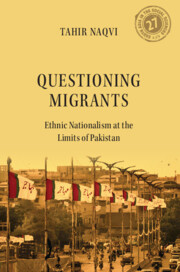2 - Concerning Voluntary Migrants
Published online by Cambridge University Press: 13 November 2024
Summary
Until Partition, the provincial capital of Karachi was a relatively small port city (pop. 200,000) whose growth during the late nineteenth and twentieth centuries was accelerated by wartime trading booms (Khuhro 1999). Sindh's attainment of provincial “independence” from Bombay Presidency in 1923 transformed Karachi into an important arena for the province's politically dominant rural Muslim elite, as well as for the All-India Muslim League (AIML), which received early but conditional support from Sindh (in notable contrast to the League's difficulties in enlisting the Punjab at this time). And yet, like many cities in what came to be known as “west Pakistan,” most of Karachi's pre-independence population was a composite of non-Muslim communities. By 1948, it had become apparent that the majority of the city's inhabitants – made up of Hindus, Sikhs, and Parsis – would be supplanted by incoming Muslim refugees and migrants. According to the first national census of 1951, the city's population had doubled since the last accounting in 1946 to approximately 450,000 and had been “more than replaced by the vast stream of incoming Muslims who … classed themselves as Muhajir” in accordance with the official definition at the time of any individual who came to Pakistan as a result of the communal “disturbances” of Partition (Census of Pakistan 1951: 131). However, as I noted in the previous chapter's discussion of the transfer of population in west Pakistan, the influx of Muslims into urban Sindh continued until well after the official transfer of population had concluded in 1949. Most of the arrivals in this case were from the erstwhile “minority Muslim provinces” of India.
Taking Karachi's post-Partition context as my focus, this chapter shifts from the narrative of mass evacuation to consider the political making of voluntary migrants. The “internal” differentiation of Pakistan's mass-migratory population into evacuees and voluntary migrants was part of the broader, situated attempt on the part of the Pakistani state to fashion itself as a sovereign power in the context of responding to “critical events” (V. Das 1995; see also Chapter 2). My aim here is to highlight how late colonial expectations of Muslim sedentarism after independence were not simply dashed by the eventualities of Partition, but to pay closer attention to specific projects of recognition, regulation, and belonging that unfolded in the decolonizing wake of mass-migration.
- Type
- Chapter
- Information
- Questioning MigrantsEthnic Nationalism at the Limits of Pakistan, pp. 48 - 70Publisher: Cambridge University PressPrint publication year: 2025

